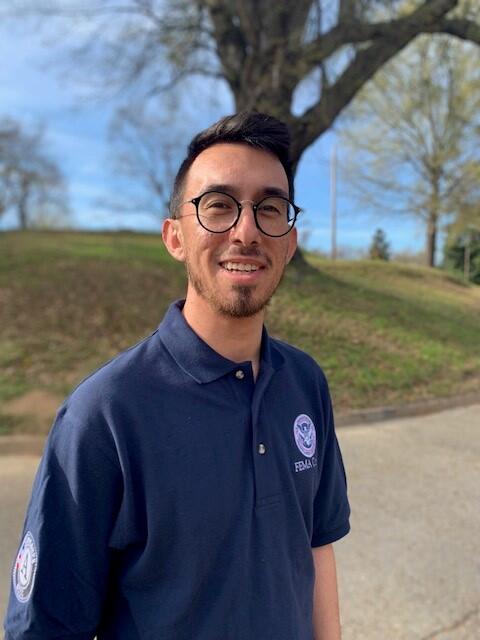Why You Should Join FEMA Corps


FEMA Corps is a unique, team-based service program that gives 18‐24‐year‐old participants the opportunity to serve communities impacted by disaster while gaining professional development experience. FEMA Public Affairs Specialist Wesley Lagenour shares his FEMA Corps experience and what it meant to him.
As someone from farm country Indiana, I never thought I would be working and living in Washington D.C.
Nowadays, I’m a writer/editor in the Office of External Affairs, and life is much different than the days of sticking my cell phone out the window to send and receive text messages. Without participating in FEMA Corps, I am not sure what I would be doing today.
After graduating from Indiana State University with my undergrad degree, I was not certain what I wanted to do, but I carried a passion for public service. That passion led me to search on AmeriCorps.gov for opportunities that lined up with my experiences, interests and skillset. And what I found was FEMA Corps.
I received my acceptance into FEMA Corps and was flown to the Southern Region Campus in Vicksburg, Mississippi on Feb. 2019. From there, I was assigned to a FEMA Corps team.
The first six weeks of the program were filled mostly with trainings. Corps members were briefed on the rules and regulations that came with participating in the FEMA Corps program, as well as FEMA trainings. The FEMA trainings focused on learning the ins-and-outs of the agency and included specialized trainings with a specific FEMA mission/program area. My team became specialized in floodplain management and mitigation.
After our training, we were deployed to various locations across the country to support FEMA’s mission. Each of the three project rounds lasted approximately 12 weeks, and each deployment was unique to the disaster recovery efforts of the area. My team was sent to the Joint Recovery Office in Guaynabo, Puerto Rico, just outside of San Juan.
The work week was a standard 40 hours, but teams deployed to an active disaster were often working 80-plus hours to support response efforts.
FEMA Corps members also had goals separate from supporting the agency. While deployed, members were expected to make a positive impact in the community we were staying in. These efforts could be creating/participating in service projects to benefit non-governmental organizations and nonprofits, or recruitment to grow the FEMA Corps program itself.
As the program progressed, the liaisons between FEMA and AmeriCorps created hiring events for the FEMA Corps members that centered around individual qualifications and interests..
And I like many other FEMA Corps members was hired to become a FEMA reservist. Butmy time as a FEMA reservist was short. I was deployed twice, with each deployment consisting of a week-long training.
In June 2020 I was contacted by the Office of External Affairs to see if I was interested in a writer position. I was thrilled. The connections I made in FEMA Corps spoke to my work-ethic and my rapport I had with the staff. I accepted a writer position with the Office of External Affairs and moved to Washington D.C. in August.
I will remain an advocate for FEMA Corps, for all prospective, current, and graduated members. FEMA Corps gave me the opportunity to expand my professional capabilities and find a rewarding career. To be a part of the mission of helping people before, during and after disasters is something that aligned with my passion of public service, and I am proud to be a FEMA CORPS alum.
Recent Posts
NOAA Weather
Tampa, FL
Last Updated on Jun 5 2024, 6:53 am EDT
Weather by NOAA
Current Conditions: Fair
Temp: 77°F
Wind: SE at 5mph
Humidity: 88%
Dewpoint: 73.0°F
 National Hurricane Center
National Hurricane Center
- The Atlantic hurricane season runs from June 1st through November 30th. April 20, 2025The Atlantic hurricane season runs from June 1st through November 30th.